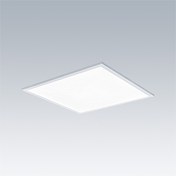Omega Pro 2 / OP2 4400-927-65 CKIT HX BC Q600
92915970
▼ Data Sheet
A recessed/surface/suspended, edge-lit LED luminaire. LED driver, Wireless controlled via App with Bluetooth® 4.x - basicDIM Wireless. Class II electrical (this product is not earthed), IP40_IP20, Impact strength: IK03. Body: steel sheet, finished white (close to RAL9016). Diffuser: UV-stabilised polycarbonate hexagonal comfort optic. Electrical connection via 7 pole piano key terminals, loop-in/loop-out possible. Complete with VCT technology (variable colour temperature), stepless tunable from 2700-6500K, DT8., Colour Rendering Index min.: 90
Radio definition: basicDIM Wireless - Bluetooth® 4.x, Radio frequency: 2.4...2.483 GHz, Radio power: +4 dBm.
Dimensions: 597 x 597 x 55 mm
Luminaire input power: 48.2 W
Luminaire luminous flux: 4450 lm
Luminaire efficacy: 92 lm/W
Weight: 5.44 kg
- LED
- CE
- Einb_NDaeMat
- ENEC11
- GLedNr
- 650°
- IK03
- IP40_IP20
- LLedNr
- RG0
- SC2
- Ta=0°C_to_+35°C

